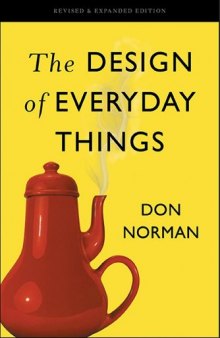 جزییات کتاب
جزییات کتاب
در ابتدا تجارتها، کیفیت را به عنوان کلید رقابت تنگاتنگ کشف کرده بودند، سپس خدمات جای کیفیت را گرفت.
در حال حاضر Donald A. Norman مدیر سابق موسسه علومشناختی در دانشگاه کالیفرنیا، آشکار کرد که چگونه طراحی هوشمند، مرز رقابتی جدید است.
طراحی امور روزمره ، یک مبنای قدرتمندی است که نشان میدهد چرا و چگونه بعضی از محصولات، مشتریان را راضی نگه میدارند در حالیکه سایر محصولات، آنها را ناامید میکنند.
"Even the smartest among us can feel inept as we fail to figure out which light switch or oven burner to turn on, or whether to push, pull, or slide a door. The fault, argues this ingenious-even liberating-book, lies not in ourselves, but in product design that ignores the needs of users and the principles of cognitive psychology. The problems range from ambiguous and hidden controls to arbitrary relationships between controls and functions, coupled with a lack of feedback or other assistance and unreasonable demands on memorization. The Design of Everyday Things shows that good, usable design is possible. The rules are simple: make things visible, exploit natural relationships that couple function and control, and make intelligent use of constraints. The goal: guide the user effortlessly to the right action on the right control at the right time. In this entertaining and insightful analysis, cognitive scientist Don Norman hails excellence of design as the most important key to regaining the competitive edge in influencing consumer behavior. Now fully expanded and updated, with a new introduction by the author, The Design of Everyday Things is a powerful primer on how-and why-some products satisfy customers while others only frustrate them"--Provided by publisher. Read more... Abstract: Even the smartest among us can feel inept as we fail to figure out which light switch or oven burner to turn on, or whether to push, pull, or slide a door. The fault, this book argues, lies not in ourselves, but in product design that ignores the needs of users and the principles of cognitive psychology. Read more...
 دانلود کتاب
دانلود کتاب
 جزییات کتاب
جزییات کتاب








 این کتاب رو مطالعه کردید؟ نظر شما چیست؟
این کتاب رو مطالعه کردید؟ نظر شما چیست؟
